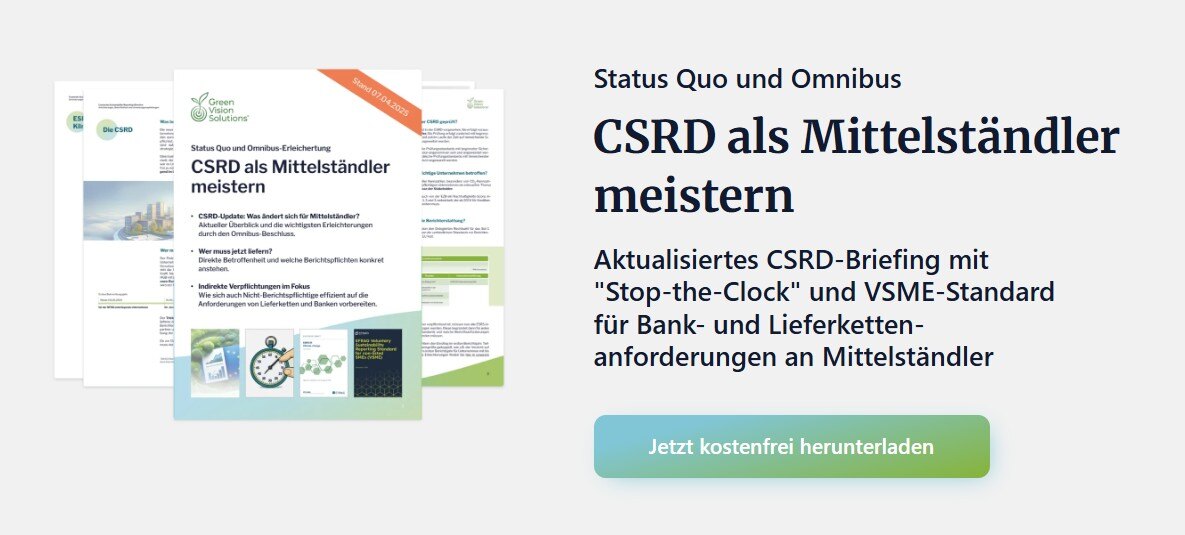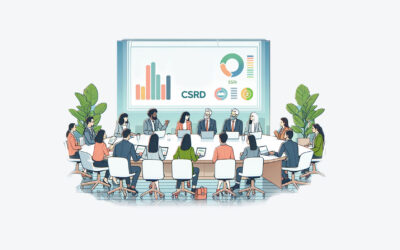More than just software: Your team for carbon accounting
We provide personalized support, a TÜV-certified process, and practical online seminars. → Learn more
| Update: 16. Juli 2025
🕓 Reading time 10 minutes
1. Background and development of EFRAG’s ESRS standards
The Corporate Sustainability Reporting Directive, or CSRD for short, is a new directive on sustainability reporting in companies. It now introduces clearly defined standards: the European Sustainability Reporting Standards (ESRS).
Until now, companies were free to choose the type and method of publication of sustainability reporting. The impact of the Corporate Sustainability Reporting Directive includes mandatory publication in the annual report. At the same time, the legal requirements of the EU are being aligned with the binding European Sustainability Reporting Standards (ESRS) set uniformly by EFRAG.
EFRAG’s first ESRS drafts (Exposure Drafts of 29 April 2022) underwent a public comment round until August 2022. In November 2022 EFRAG finally decided ESRS published, which the European Kommission übermittelt wurden. In dieser Version wurden gegenüber der Entwürfe von April noch einige Punkte verschlankt.
On August 9, 2024, a second correction to the German translation of ESRS Set 1 was published in the EU Official Journal. It includes some linguistic changes and applies only to the German version.
On July 10, 2025, EFRAG published internal, uncoordinated Exposure Drafts on the revised ESRS texts – however, these are still under discussion and revision.
The most recent amendment was made with the so-called “Quick Fix” by the European Commission on July 11, 2025. This delegated act clarified and adjusted certain provisions, in particular regarding the omission of certain disclosure requirements for Wave 1 companies in the 2025 and 2026 financial years.
2. Overview of the individual ESRS standards
European Sustainability Reporting Standards (ESRS) as of July 31, 2023:
Cross-cutting standards
- ESRS 1 General principles
- ESRS 2 General disclosures
Environment
- ESRS E1 Climate change → To the ESRS E1 blog post
- ESRS E2 Pollution
- ESRS E3 Water and marine resources
- ESRS E4 Biodiversity and ecosystems
- ESRS E5 Resource use and circular economy
Social
- ESRS S1 Own workforce
- ESRS S2 Workers in the value chain
- ESRS S3 Affected communities
- ESRS S4 Consumers and end-users
Corporate governance
- ESRS G1 Business conduct
Where can I find the ESRS standards?
Below you will find the ESRS in German from 31.07.2023 with linguistic correction from 09.08.2024 for download as PDF
The final standards are now available in 23 language versions, including German. The ESRS (German) can be found here:
To the source: https://eur-lex.europa.eu/legal-content/DE/TXT/PDF/?uri=OJ%3AL_202490457
3. Timeline: Which ESRS standards must be reported?
November 2022: Green light for the CSRD
On November 28, 2022 the European Council had finally given green light for the Corporate Sustainability Reporting Directive (CSRD) which came into force on 5 January 2023.
As of November 2022, the mandatory standards included, first, the General Disclosures and Governance Disclosures (ESRS 2), and, second, for companies with 250 or more employees, the ESRS S1 Own Workforce and, thirdly, the EFRAG Standard ESRS E1 Climate Change. Whether further standards need to be reported should depend on their materiality for the company at the time and be assessed on an individual basis.
June 2023: Simplified drafts of the ESRS
In June 2023, the EU presented a revised version of the first set of 12 ESRSs, incorporating some simplifications, for re-opening the consultation. With the exception of ESRS 2, which is always mandatory, all other ESRSs are now subject to materiality analysis.
VSME & Omnibus simplifications
Current simplifications and carbon accounting for CSRD or supply chain inquiries
19. Nov., 10.30-11.15 Uhr
August 2023: Final adoption of the ESRS
On 31 July 2023, the EU Commission adopted the delegated act for Set 1 of the European Sustainability Reporting Standards (ESRS). This establishes the binding standards for sustainability reporting in the EU.
With the exception of ESRS 2, which is always mandatory, all other ESRSs must now undergo a materiality analysis. In addition, all reporting requirements and data points related to ESRS 2 IRO-1 (Description of the process for identifying and assessing material impacts, risks, and opportunities) are mandatory regardless of the company's materiality analysis, provided they are listed in the environmental standards (ESRS E1 to E5) or ESRS G1.
November 2023: EFRAG publishes ESRS Q&A Platform
To support companies in preparing their sustainability reports, the European Financial Reporting Advisory Group (EFRAG) has created a Q&A platform on the European Sustainability Reporting Standards (ESRS). The main objective of the ESRS Q&A platform is to capture and answer technical questions that remain unresolved despite in-depth analysis by stakeholders.
Questions about the ESRS can be submitted on this page.
May 2024: EFRAG publishes answers to the submitted questions
On May 30, 2024, EFRAG published a collection of 68 questions and answers (Q&A) addressing questions related to the first sentence of the ESRS. They are intended to provide practical support for the implementation of sustainability reports.
The EFRAG Q&A document can be found linked here.
August 2024: Adjustments in the German translation
Most recently, a second corrigendum to the German translation of ESRS Set 1 was published in the Official Journal of the EU on August 9. It includes some linguistic changes in the German version.
For example, "potential financial impacts" has been changed to "expected financial impacts." Furthermore, unnecessary duplication of words in "expected financial impacts from impacts, risks, and opportunities related to biodiversity and ecosystems" has been avoided by deleting the second "impacts." Furthermore, the term "corporate policy" in ESRS G1 has been replaced with "corporate governance," which also entails changes in content. The English term "policies," previously translated as "strategies," is now rendered as "organizational policies" or "corporate guidelines."
April 2025: Stop the clock for the second and third waves
With the „Stop-the-clock“ decision of April 3, 2025, the sustainability reporting requirements for the second wave (originally from January 1, 2025) and the third wave (originally from January 1, 2026) will be postponed by two years. This means that companies have more time to prepare for the legal requirements.
July 2025: Quick fix for the first wave
With a delegated act, the EU Commission decided on July 11 to grant relief to companies affected by the first wave for the reporting years 2025 and 2026:
✓ Extended exemption: Companies may omit the same disclosures for the reporting years 2025 and 2026 as in 2024 – no additional reporting effort.
✓Suspended ESRS standards: Temporary non-application of ESRS E4 (biodiversity and ecosystems), ESRS S2 (workers in the value chain), ESRS S3 (affected communities), and ESRS S4 (consumers and end users) standards possible
✓ Relief for companies with fewer than 750 employees: These companies may additionally omit ESRS S1 (own workforce) in the first reporting year.
✓ No obligation to provide additional information: Information on the financial impact of climate or biodiversity risks, Scope 3 emissions, or social indicators may also be deferred or simplified.
✓ Safeguard rule remains in place: If a topic is classified as significant, it must still be reported on—at least in brief.
4. What changes compared to previous Carbon Accounting and Reporting Standards?
The European Sustainability Reporting Standards contain specific applicable practices, calculations, and reporting layouts. The ESRS Climate Change is based, among other things, on the Greenhouse Gas Protocol. The Corporate Accounting and Reporting Standard of the Greenhouse Gas Protocol is the most important internationally recognized standard for recording greenhouse gas emissions. It retains its relevance even with the new ESRS standards, as it represents an important technical basis. For example, the breakdown of emissions into Scope 1, Scope 2 and Scope 3 is used in the ESRS E1. The GHG categorisation of the Scope 3 subcategories is also central to the new standard.
In particular, the reporting of Scope 3 emissions in accordance with the ESRS E1 Climate Change standard presents many companies with new challenges. There are data gaps that need to be filled and uncertainties as to which data is actually required for recognized accounting. For these reasons, the approach to Scope 3 emissions in particular should be supported by experts.
Based on the essence of our practical experience, our team at Green Vision Solutions has developed a clear and TÜV-certified process for the corporate carbon footprint – and has already successfully applied it to over 200 companies. We work with you to collect Scope 1, 2, and 3 – guaranteed to be simple and requiring no prior knowledge on your part:
Sources
EU-Kommission – Commission adopts ‘Quick Fix’ for companies already conducting corporate sustainability reporting
https://finance.ec.europa.eu/publications/commission-adopts-quick-fix-companies-already-conducting-corporate-sustainability-reporting_en Accessed on July 16, 2025
Haufe Sustainability – EU-Kommission beschließt „Quick-Fix“ für die Nachhaltigkeitsberichterstattung: https://www.haufe.de/sustainability/strategie/eu-kommission-beschliesst-esrs-quick-fix_575772_656228.html?ecmId=45768 Accessed on July 16, 2025
EFRAG – Draft Amended ESRS Exposure Drafts (10. Juli 2025)
https://www.efrag.org/sites/default/files/media/document/2025-07/03-cover-_intro_to_draft_amended_esrs_wording_documents.pdf Accessed on July 16, 2025
KPMG International – EU releases Omnibus proposals:
https://kpmg.com/xx/en/our-insights/ifrg/2025/esrs-eu-omnibus.html
Accessed on July 16, 2025
Subscribe to our free climate news (de) and never miss any industry news or articles!
Topics
Latest post
Kostenfreie CO₂-Rechner im Check: Von ECOcockpit bis EFRAG
Mehr als nur Software: Ihr Team für CO₂-BilanzenWir begleiten mit persönlicher Beratung, einem TÜV-zertifizierten Prozess und praxisnahen...
Introduction to the CO₂ balance
Calculate your CO2 footprint: This is the data companies need for their carbon footprint
Mehr als nur Software: Ihr Team für CO₂-BilanzenWir begleiten mit persönlicher Beratung, einem TÜV-zertifizierten Prozess und praxisnahen...
Regulatory frameworks
The implementation of the CSRD in Germany | 2025
Mehr als nur Software: Ihr Team für CO₂-BilanzenWir begleiten mit persönlicher Beratung, einem TÜV-zertifizierten Prozess und praxisnahen...
Entdecken Sie unsere Seminare & mehr
Hier finden Sie praxisorientierte Wissensangebote rund um die Treibhausgas-Berichterstattung

3.–5.11. | 3 Tage | Online-Seminar
Calculation of the greenhouse gas balance via Scope 1-3
Learn how to calculate GHG emissions yourself - with methods, sources for emission factors and practical relevance

Di 07.10. | 4 h | Online-Seminar
Materiality analysis and data preparation for CO₂ reporting
Avoid errors and additional effort: Which Scope 1 to 3 data are actually relevant according to GHG?

Do 09.10. | 3 h | Online-Seminar
Scope 3 Data Dilemma
Between data gaps and mountains of data: Coping with GHG in practice






